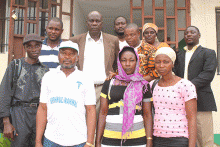Weak health systems caused the Ebola crisis in Liberia

Liberia’s pre-Ebola health sector was poorly funded and under-resourced with only three health workers for 10,000 people while the International Labour Organization (ILO) estimates 41 to be necessary for an adequate health care system.
Fortunately for all three Ebola countries, the international community stepped in and now, at the end of the emergency period, Infection Prevention and Control materials are widely available. This current level of availability must be maintained at all times in order to avoid a future recurrence of the massive death toll among health workers and population. Health workers still need training and constant refreshers on Ebola control by the World Health Organisation (WHO) and other partners to keep them up to the task at all times.
However, those who take care of the sick in the country, are not being taken care of.
Thousands of volunteer health care workers who have served the nation for years are still working for free. These professional women and men have no job security, social security, pension scheme, medical or death benefits but are doing the same jobs and carry the same responsibilities as those with official employment.
The health system is understaffed and health sector unions in the country are waging a major battle to obtain first and foremost official employment of these volunteer workers, while at the same time fighting for adequate wages and hazard pay as well as appropriate training and protective equipment for current health workers. In the last ten years not one public health worker has been vaccinated against any disease condition and no Occupational Health & Safety Division have been installed at workplaces.
Trade union repression and intimidation is rife, and although Liberia has ratified ILO convention C98 on the Right to Organise, it still does not allow public servants to join a union. The National Health Workers' Association of Liberia (NAHWAL) which organises health workers in the public sector despite having gone through all required processes and paying Business Registry tax as a trade union for two years in a row, has been denied a union certificate and is not recognised by its own government. As a result, health workers’ unions are not included in consultations by the government.
In February 2014, following a nationwide strike in protest of working conditions and the lack of protective equipment and medication, the Health Minister of Liberia arbitrarily dismissed 22 union leaders throughout the country. Although twenty were later reinstated, NAHWAL President, Joseph S. Tamba and Secretary General George Poe Williams have not yet been reinstated. One of the 22 dismissed leaders, Martha C. Morris, Chapter Head of Bong County, was eventually reinstated after having been removed from the payroll for 8 months. However, after openly questioning the working conditions and wages of the staff of an Ebola Treatment Unit (ETU) she was again denied employment and has never been paid the eight months’ salary the government owes her. Another NAHWAL leader, Borris Grupee of River Cess County, was transferred to an isolated village making it impossible for him to oversee the affairs of NAHWAL in that county.
These arbitrary dismissals of trade union leaders is intimidating workers who have no job security and many union members have become afraid of being identified with trade unions.
In February and later on in October 2014, following strikes by health workers the government brought in unexperienced personnel, some of them not even health professionals, promising three times the usual salary while threatening to dismiss those who would not report to work. Many of them did not get paid at all.
Despite an agreement on August 9, 2014 between President Johnson Sirleaf and the health workers’ union, not all health workers have received their Ebola hazard pay. Many public sector health workers have only received a portion of the amount they are entitled to while very few private health workers have received payment at all. The lack of appropriate financial compensation is compounded by administrative errors leading to arrears in the payment of regular wages especially in hard to reach areas.
Both the public sector union, NAHWAL, and its private sector counterpart, the National Private Sector Health Workers' Union of Liberia (NPSHWUL), are very concerned about the fact that the government claims that all public health workers, contact tracers and response team workers have been paid.
The unions want to know for a fact how many health care providers were paid and are calling for the creation of a neutral body with representatives from the government and workers' leadership, to validate the figures. The unions are also calling for an extension of the deadline for claim declaration in order to allow those in hard to reach places to hear and respond to the call, as well as giving private sector health workers the chance to check their payments.
For more information see NAHWAL's press release (PDF)

